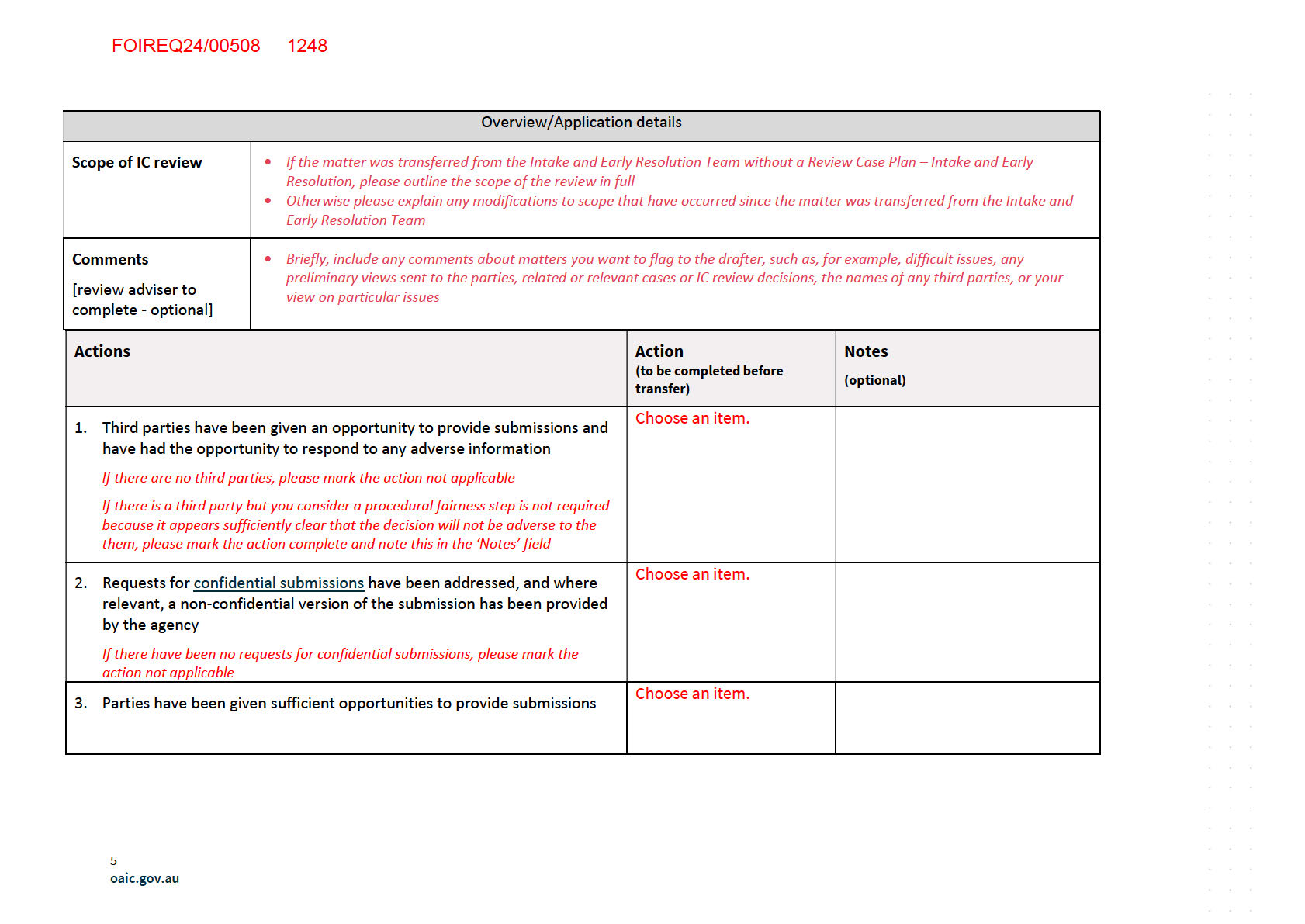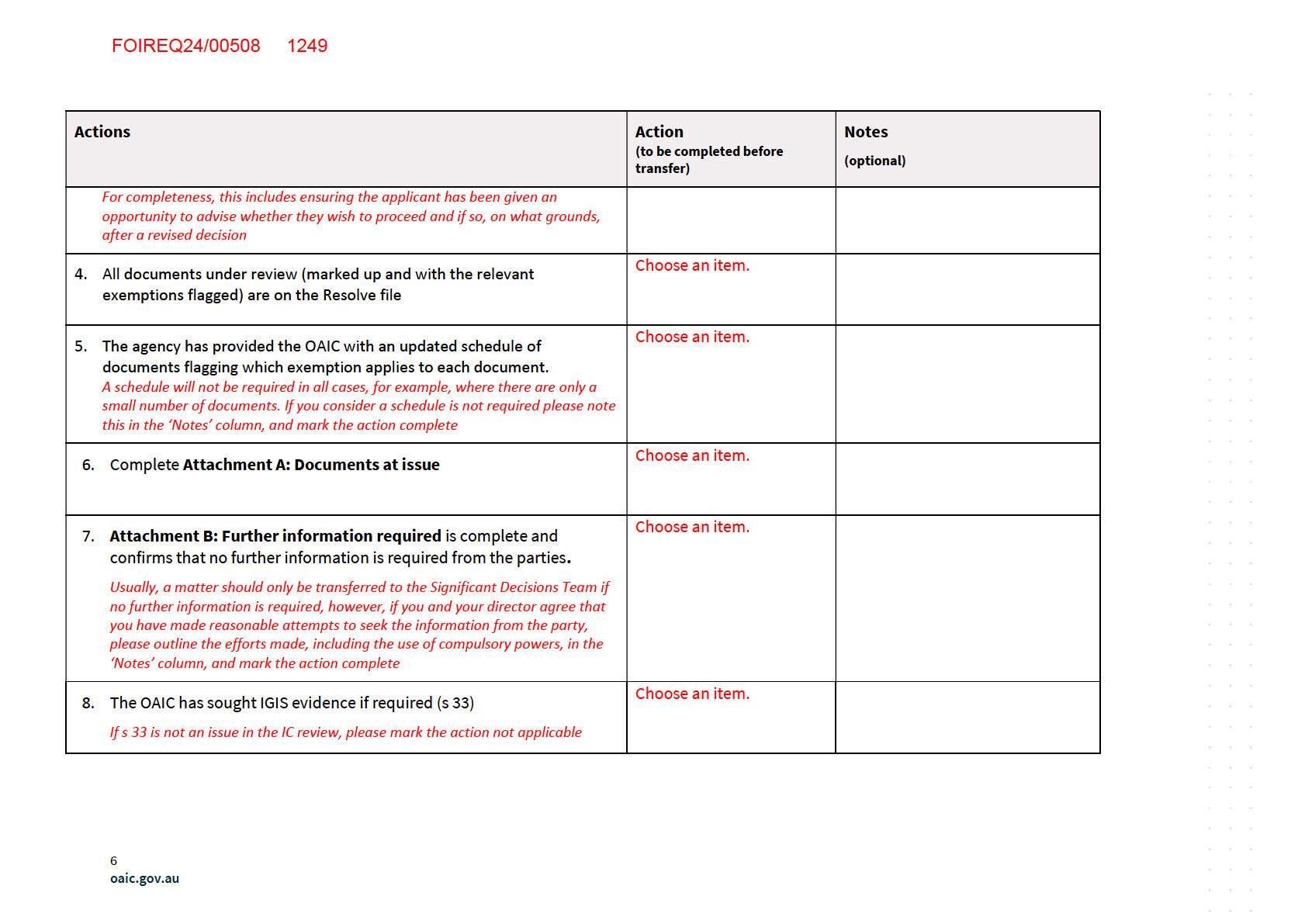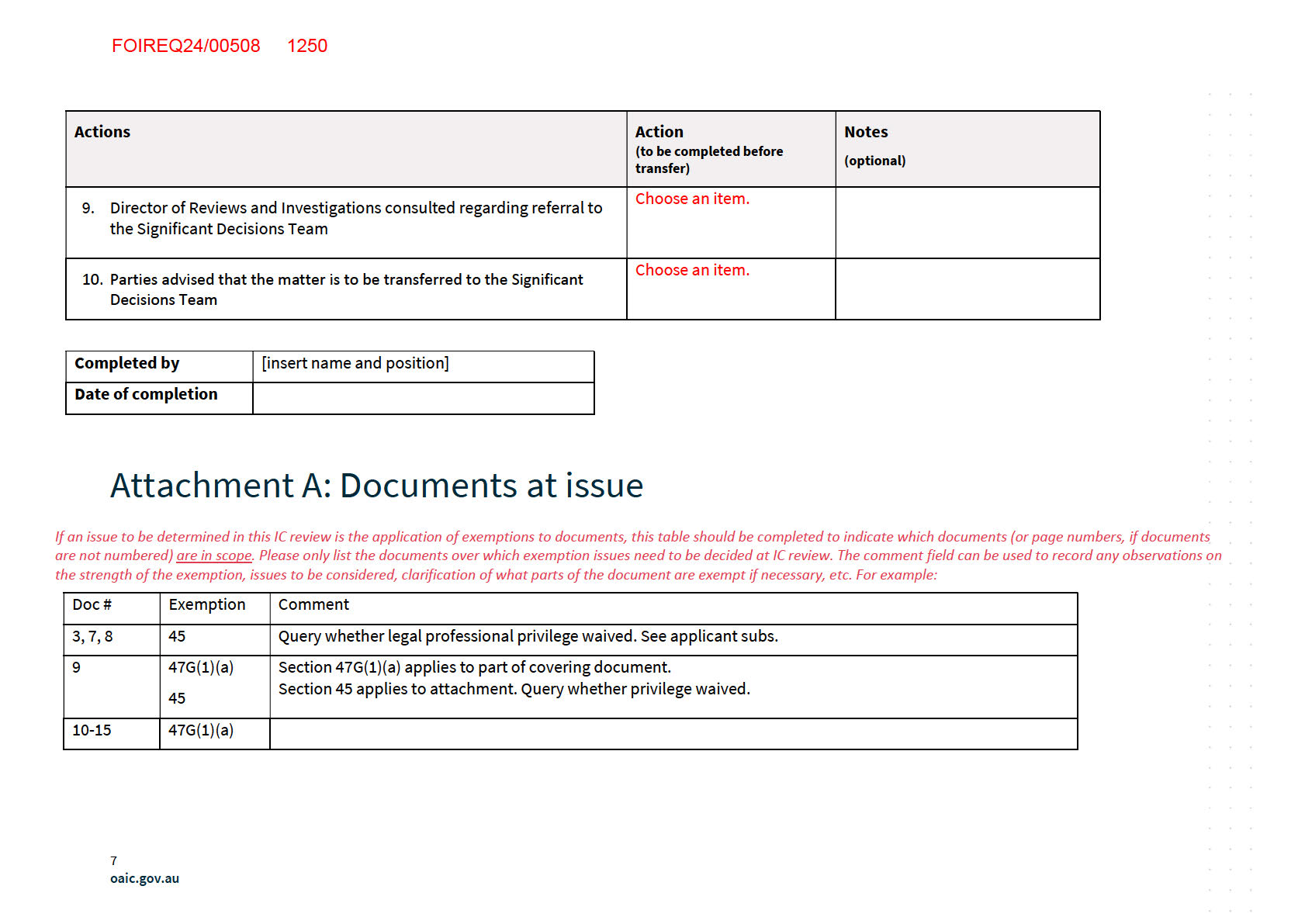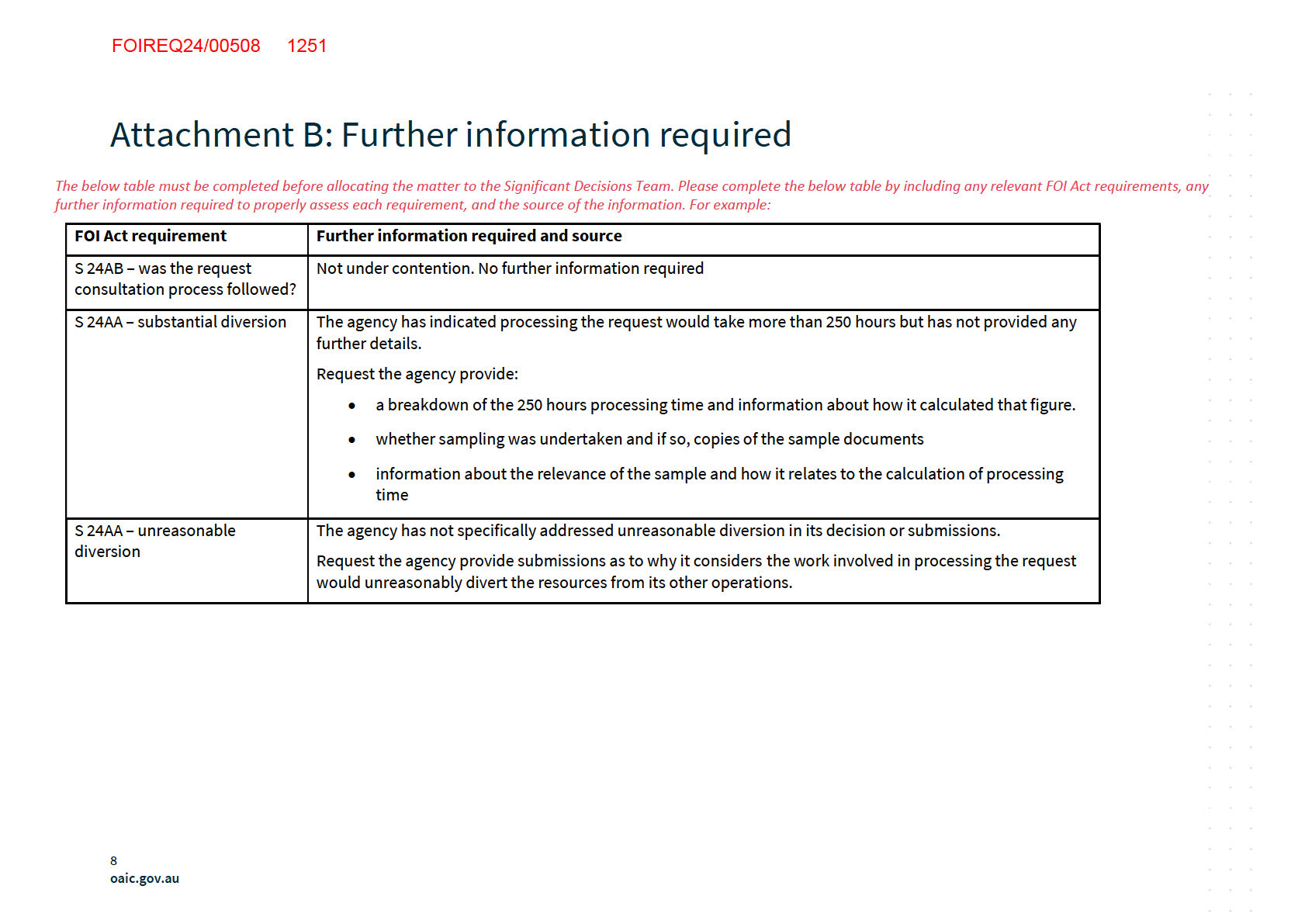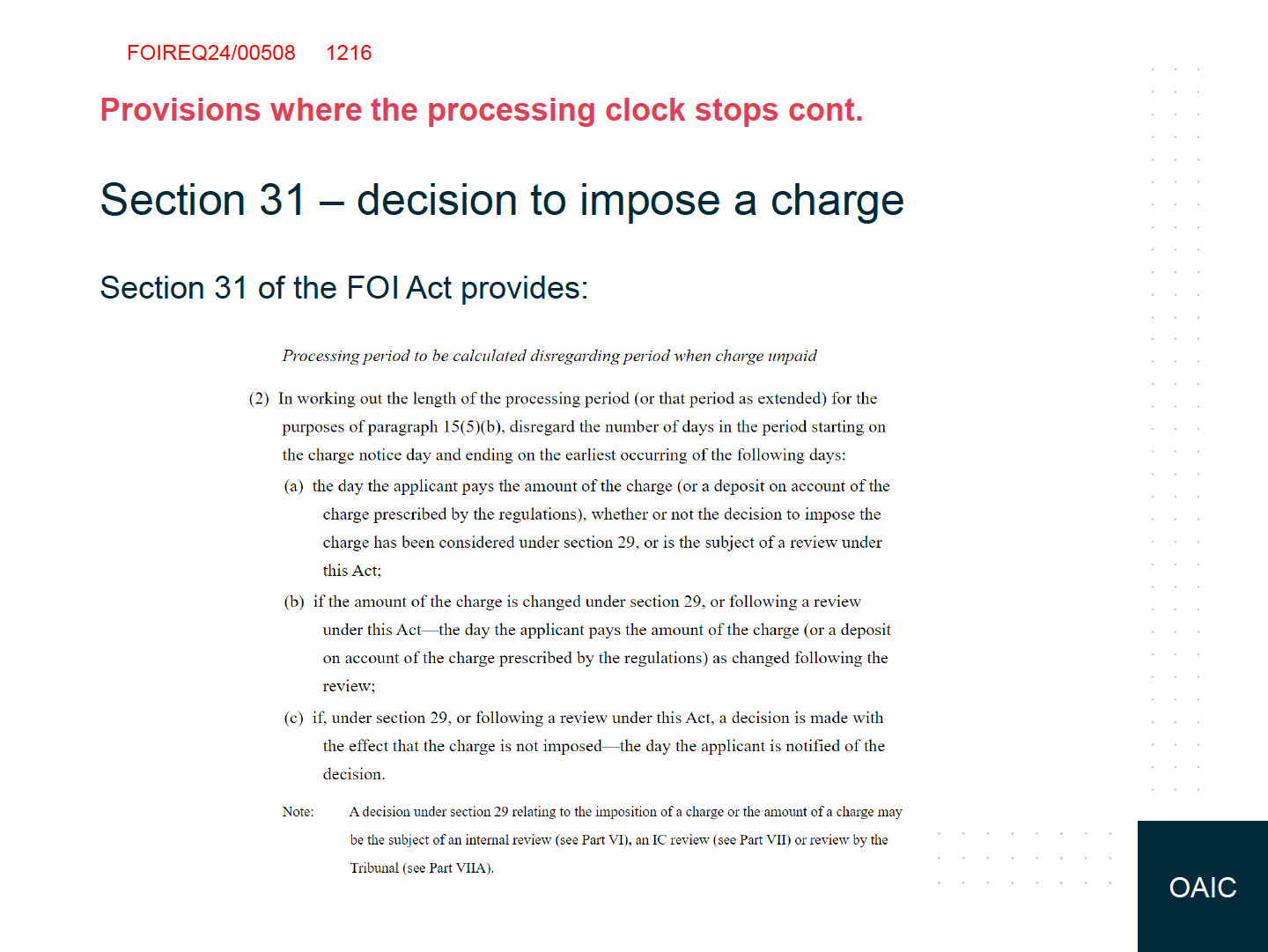
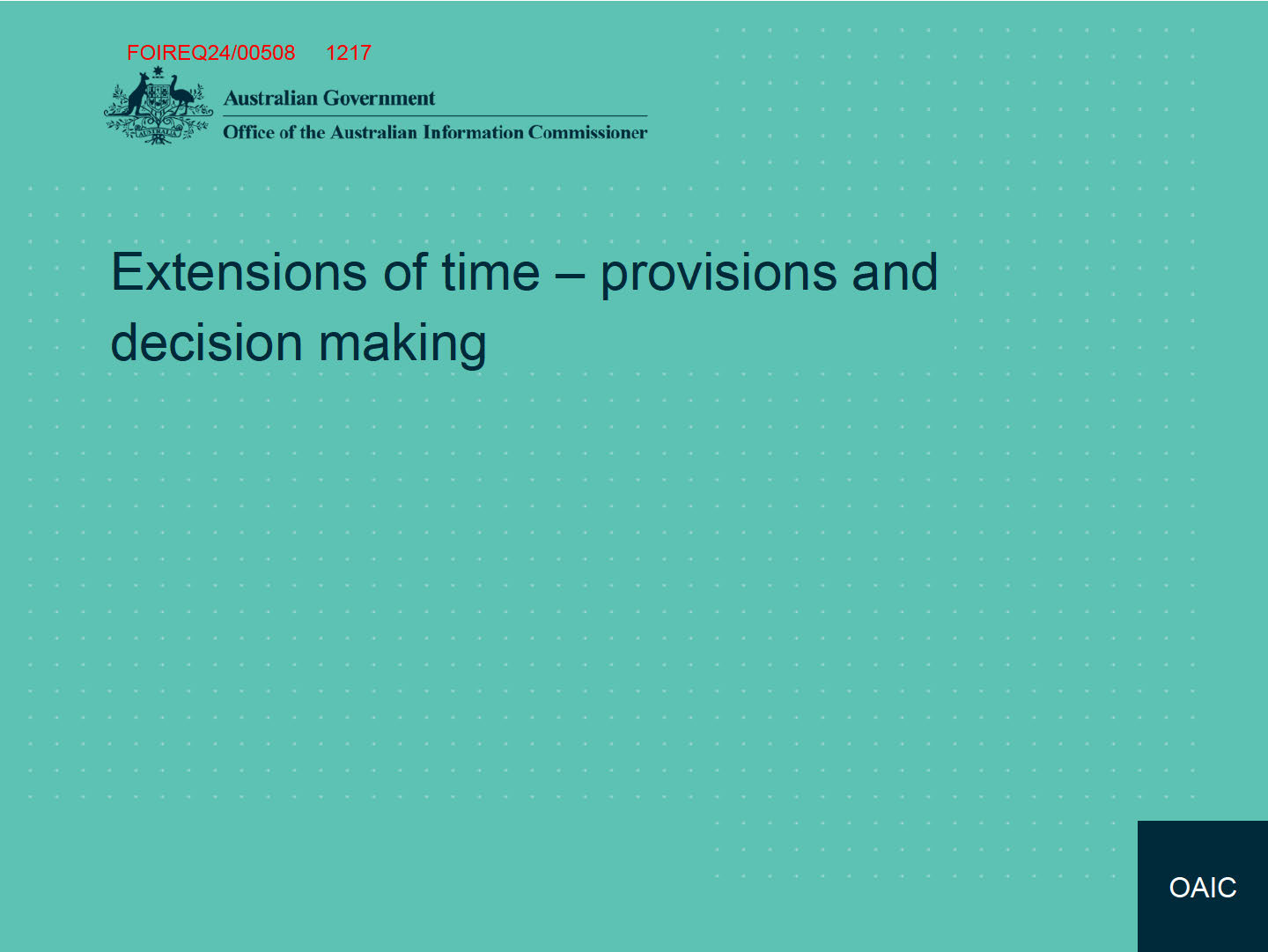


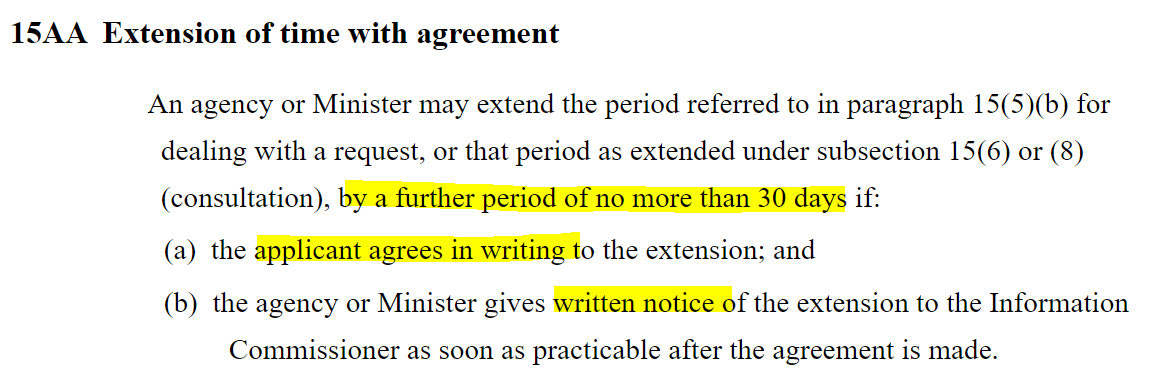
FOIREQ24/00508 1218
Section 15AA
OAIC


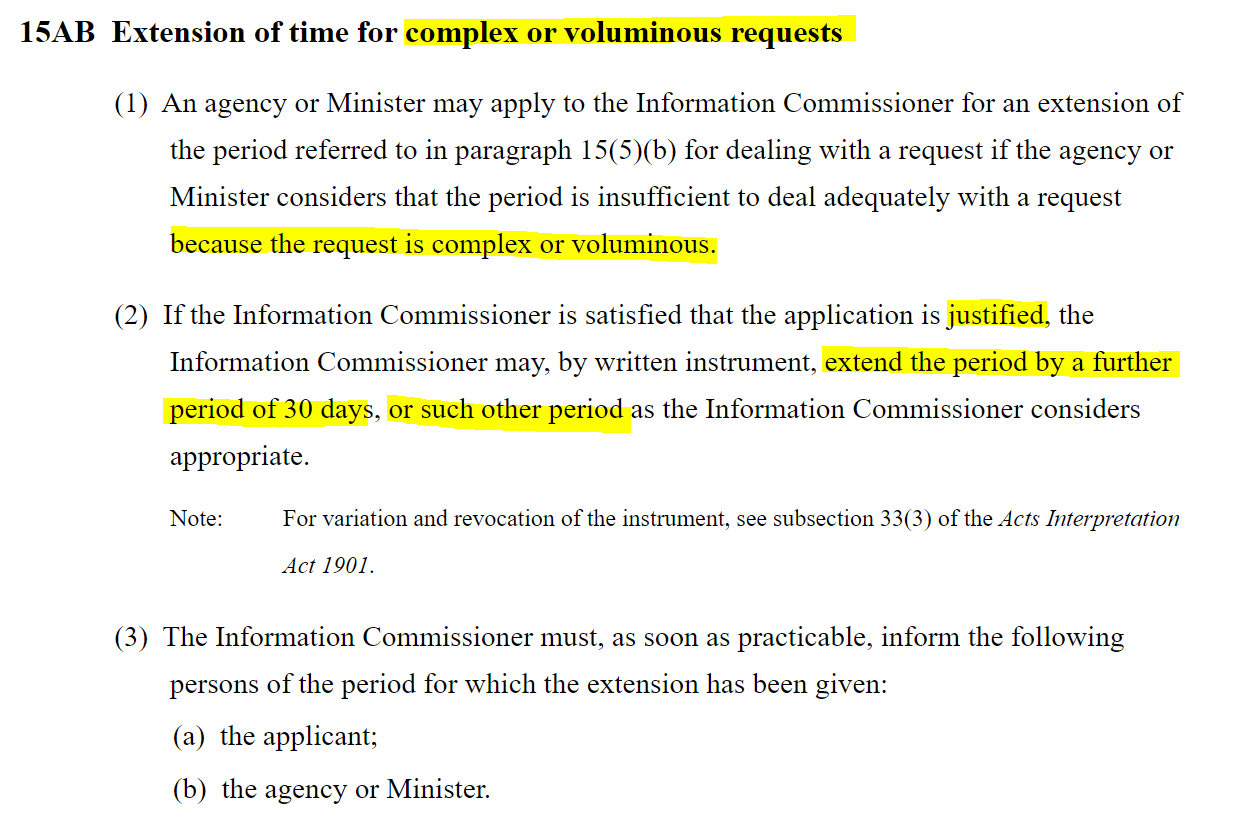
FOIREQ24/00508 1219
Section 15AB
OAIC


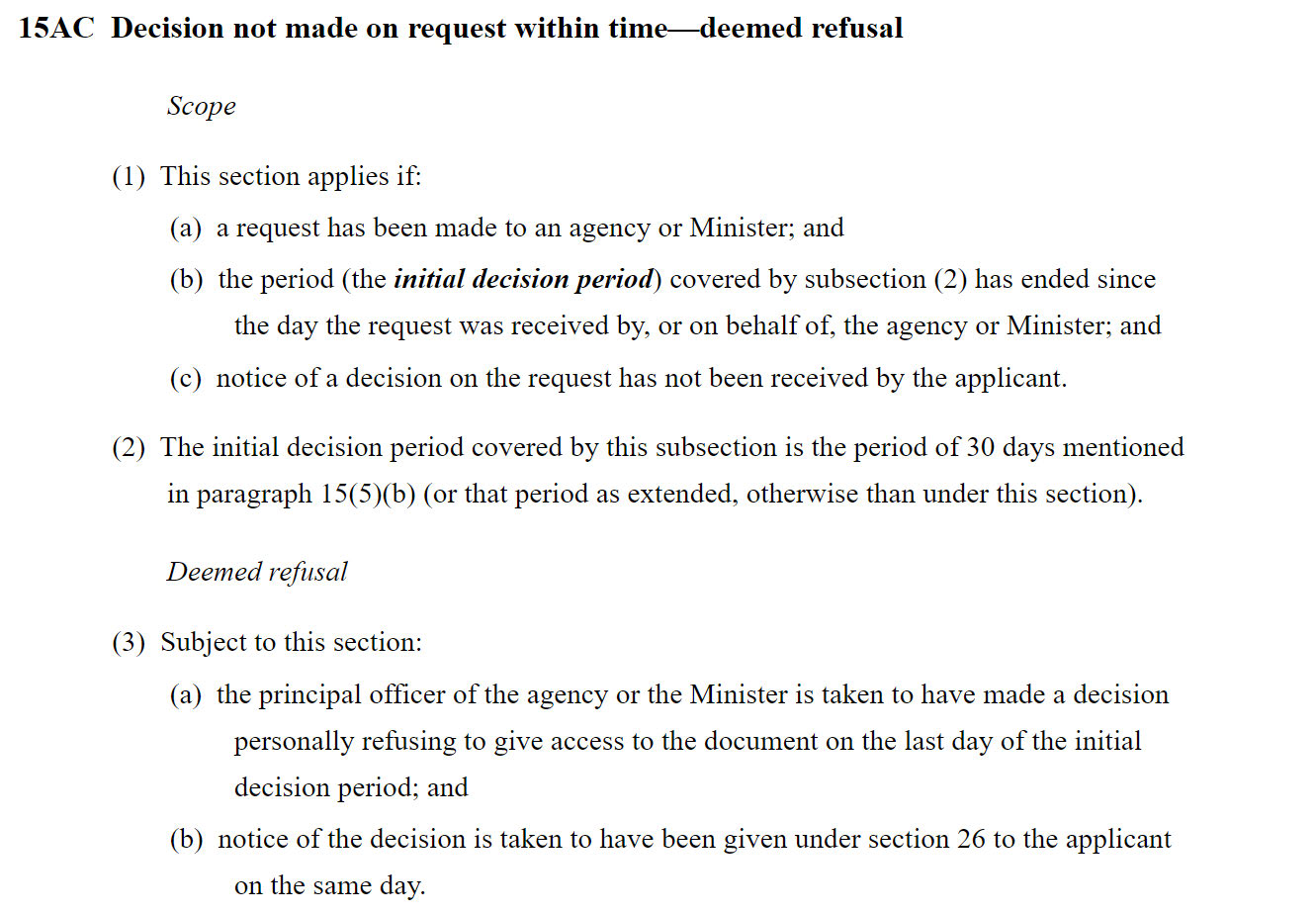
FOIREQ24/00508 1220
Section 15AC
OAIC
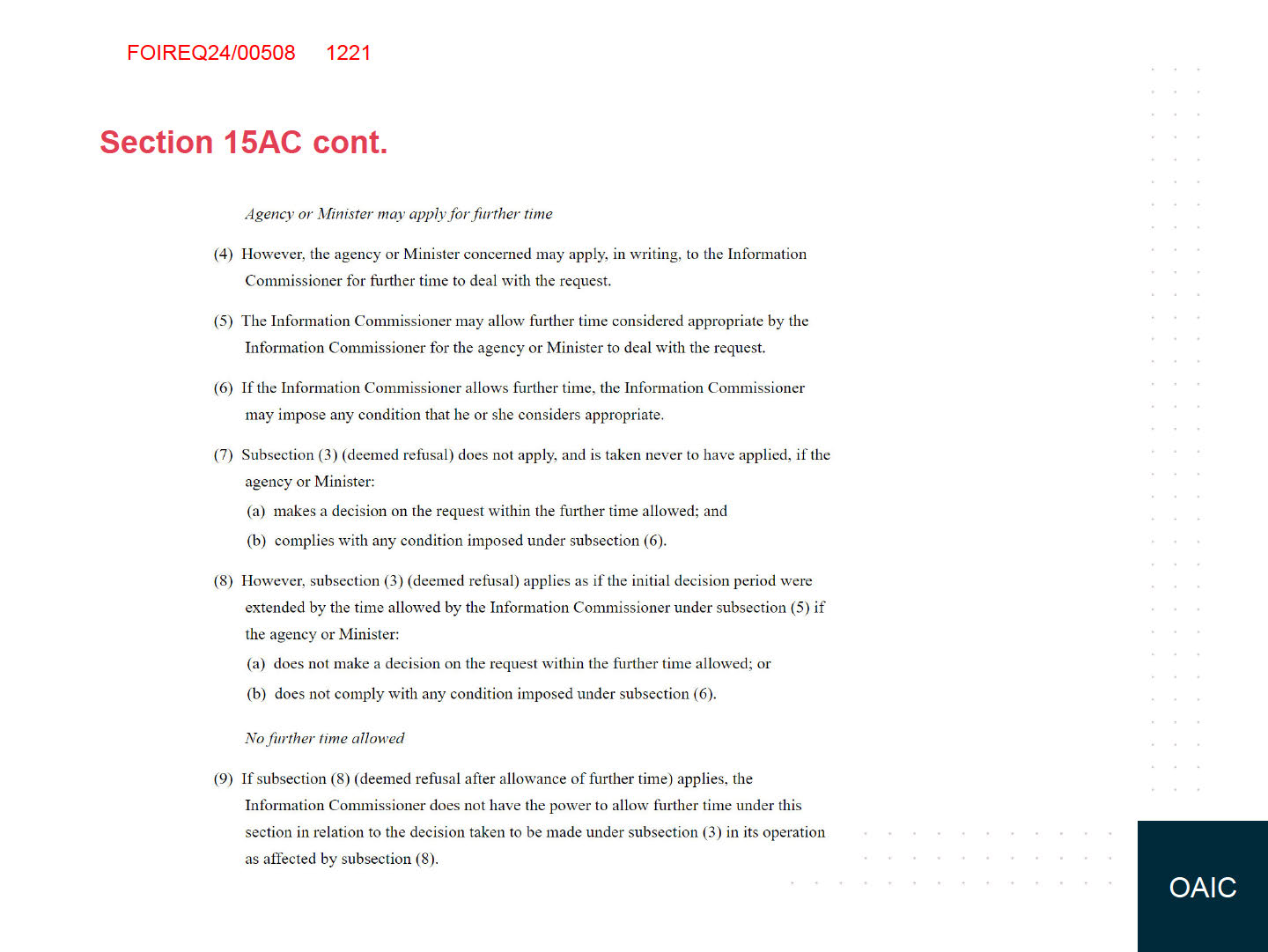


FOIREQ24/00508 1222
Decision making
• Based on the facts and circumstances
• Is the extension appropriate?
• Consider the FOI applicant’s comments
• Decision makers can grant, decline or vary
OAIC
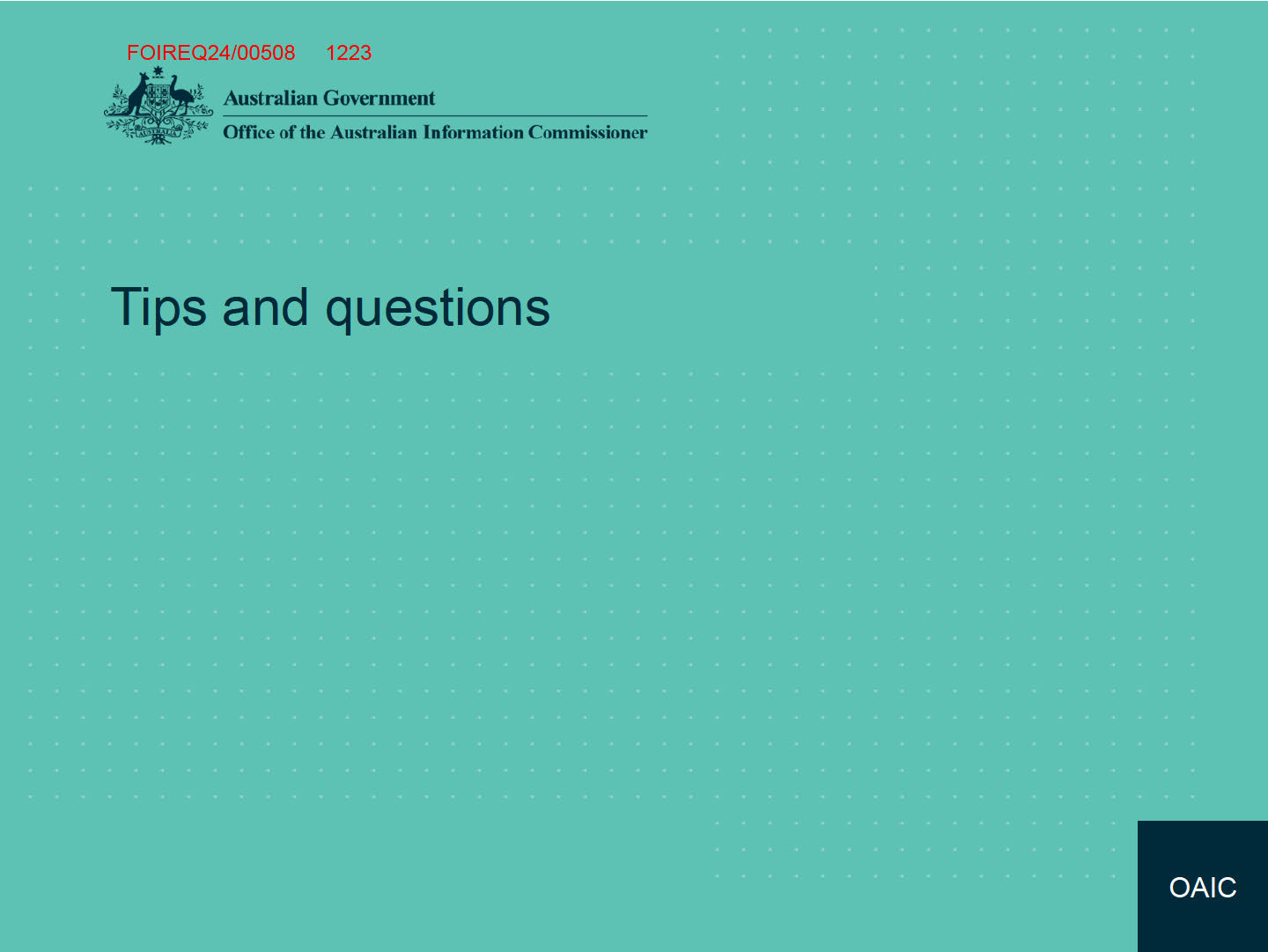


FOIREQ24/00508 1224
Tips
• Check the dates – agencies don’t always get it right
• Has the agency applied for the correct type of EOT?
• Has the OAIC been notified of the s 15AA? – if not request a copy
• Is the reasoning adequate? – if not, conduct RFIs
• Do I need to consult with the FOI applicant?
OAIC
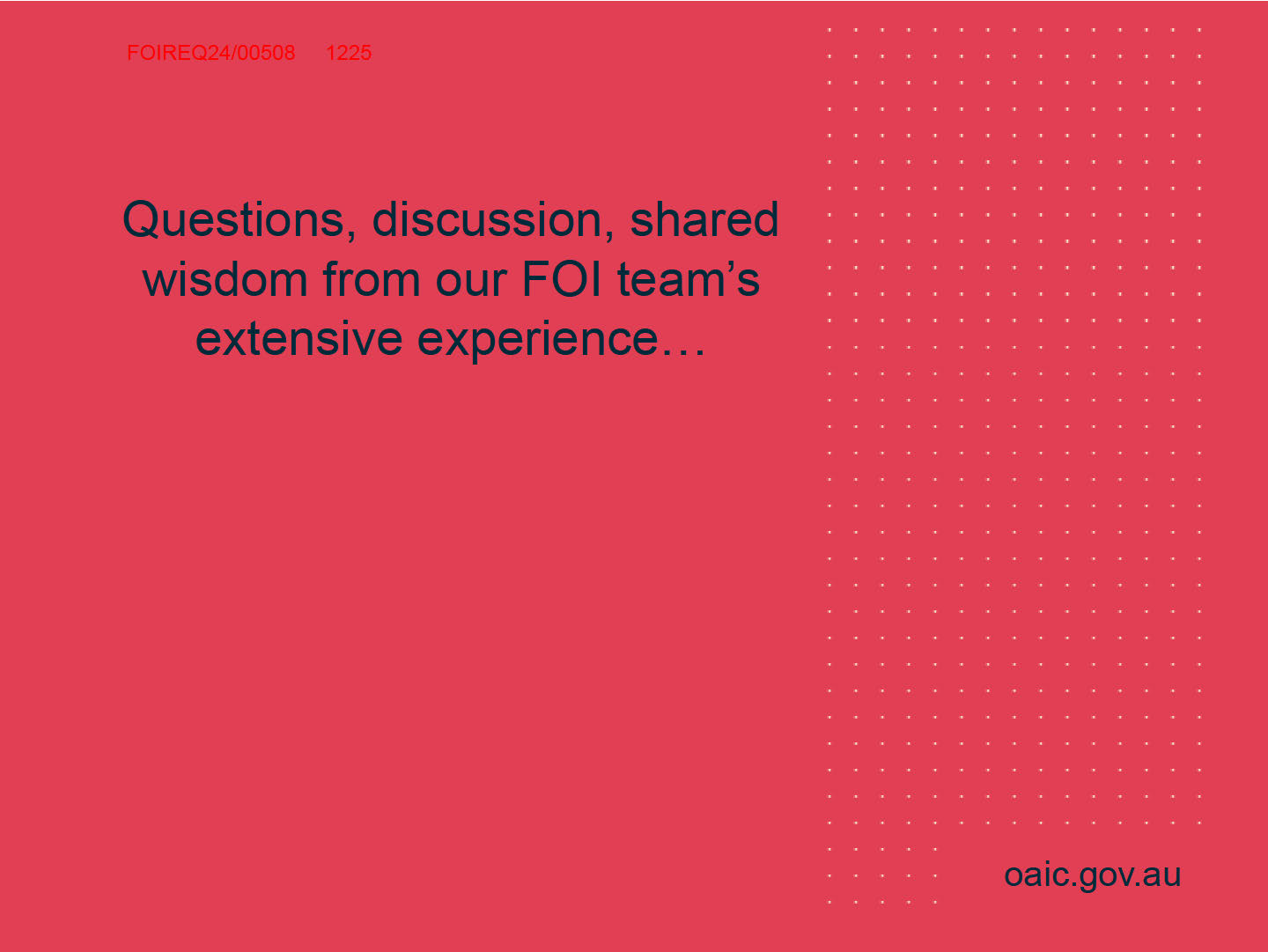
FOIREQ24/00508 1226
LAI,Bernie
From:
STRATHEARN,Tania
Sent:
Thursday, 25 May 2023 11:01 AM
To:
LAI,Bernie; HANAEE,Thomas; HARRIS,Noah
Subject:
15AC EOT requests [SEC=OFFICIAL]
Hi team
In relation to deciding 15AC EOT requests, the agency would still need to justify why the additional processing
time is appropriate, and our decisions should include the reasons as to why we consider the extension justified. It
would not be sufficient to say that granting the extension is justified because it supports the purpose behind
15AC- otherwise the granting of extensions be an automated function.
While the purpose of a 15AC extension is to avoid the need for the applicant to seek IC review of the deemed
refusal, s 15AC(5) states that the Commissioner ‘may allow further time considered appropriate’ for the agency or
minister to deal with the request. It is clear from these terms that any granting of an extension would still need to
be justified, and it will not be appropriate in every case for an extension to be granted.
Our FOI Essentials guidance makes clear that reasons need to be provided by the agency to support an extension
of time:
Extension following a deemed refusal decision (ss 15AC, 54D, 51DA)
An agency may apply to the OAIC for further time after a decision has become deemed (either under s 15AC or
under s 54D after an application for internal review). The application may only be made after the processing
period has finished. An extension in these circumstances can only be granted once and, once granted, cannot be
extended further.
The agency must justify why an extension is appropriate. The OAIC may extend the processing period by an
amount of time suitable to the circumstances and may impose conditions on the extension.
…
When applying to the OAIC for an extension of time, make sure you explain your reasons for seeking an extension
of time… At a minimum, agencies should explain:
the reason for needing an extension (it is not sufficient to say that the request is voluminous — explain
how many documents are covered by the request; the number of duplicates (if known); the nature of
the documents (their size, format or classification may be relevant); any factors slowing their
processing; whether the agency has consulted with the applicant to try to reduce the scope of the
request; whether a schedule of documents has been developed; whether the schedule has enabled the
agency to identify documents appropriate for earlier staged release and so on)
work already undertaken in processing the request
work required to finalise the request
work undertaken on the request fol owing any earlier extension granted
any consultation with the applicant concerning length of time
whether other agencies or parties have an interest in the request
measures that would be taken to ensure a decision is made within the period of extension and to keep the
applicant informed about progress.
1





FOIREQ24/00508 1227
The OAIC does not take decisions to extend timeframes lightly and agencies should use the text box to provide
formal, structured and complete reasoning.
The FOI Essentials also provides clarity around the implications of a 15AC decision, including where an extension
under 15AC(5) is or isn’t granted:
What happens if you do not meet the statutory timeframe
Agencies should continue to process an FOI request even where the statutory timeframe has expired and an
extension of time has been refused or not sought. The expiry of the timeframe gives the applicant the right to
apply for review of a deemed decision — it does not remove the agency's obligation to process the request. The
agency's obligation ceases only when the Information Commissioner commences a review of a deemed decision
(that is, the date the OAIC notifies the parties that it is commencing a review, not the date an application for IC
review is lodged). At that point, the Information Commissioner has assumed jurisdiction over the matter and the
provisions of the FOI Act relating to IC review apply (including an agency's power to vary an access refusal
decision under s 55G).
This means that where we refuse to grant a 15AC, or the agency hasn’t requested an extension under 15AC, that it
still retains an obligation to continue to process the request until such time as the applicant seeks IC review of the
deemed decision [in which case it will be more appropriate that a 55G decision is made where appropriate].
We will be revising the 15AC decision templates shortly to make them consistent in style to the new 15AB
templates, but the current templates should still include clear reasoning.
Where the reasons provided are insufficient to justify the further time requested, we should either be inviting
further reasons from the agency to justify the extension, or declining the request. Our decisions are also subject to
review by the Federal Court and need to be legally defensible.
Also as you know, 15AC decisions to grant can only be made before the agency has notified the applicant of its
decision.
If you think it would be helpful to have a separate training session or discussion about 15AC requests, please let
me know.
Kind regards
Tania
Tania Strathearn | A/g Director
Intake and Early Resolution Team
Freedom of information Regulatory Group
Office of the Australian Information Commissioner
GPO Box 5218 Sydney NSW 2001 | oaic.gov.au
02 9942 4165 | xxxxx.xxxxxxxxxx@xxxx.xxx.xx
|
|
|
Subscribe to Information Matters
2
FOIREQ24/00508 1228
June 2023
FOI Complaint recommendation cases:
Overview of process
This resource applies to managing FOI Complaint Recommendation Cases and should be read in
conjunction with Part 11 of the FOI Guidelines, the Regulatory Action Policy and FOI Complaints:
Overview of investigation process resource.
Key principles
• The Information Commissioner can investigate under Part VIIB of the FOI Act agency actions
relating to the handling of FOI matters. This involves investigating complaints received from
complainants (s 70) as well as conducting own motion investigations (s 69(2)).
• The complaints process set out in Part VIIB is primarily intended to deal with the manner in
which agencies handle FOI requests and procedural compliance matters.
• The FOI Act sets out certain rules that apply to the conduct of the Information Commissioner’s
complaint investigations and Commissioner initiated investigations. The guiding principle is
that an investigation shall be conducted in private and in the way the Information
Commissioner considers fit (s 76(1)).
• On completing an investigation, the Information Commissioner must provide a ‘notice on
completion’ to the agency and to the complainant (if there is one) (s 86).
• The Information Commissioner’s notice must include the investigation results, the
investigation recommendations (if any), and the reasons for those results and any
recommendations (s 86(2)).
• In addition to including opinions, conclusions or suggestions in a notice on completion, the
Information Commissioner may also make ‘formal recommendations to the respondent
agency that the Information Commissioner believes that the agency ought to implement’ (s
88).
• If the Information Commissioner is not satisfied that the agency has taken adequate and
appropriate action to implement a formal recommendation, the Information Commissioner
may issue a written ‘implementation notice’ requiring the agency to provide within a specified
time particulars of any action the agency will take to implement the Information
Commissioner’s recommendations (s 89).
FOIREQ24/00508 1229
FOI Complaint Recommendation Case Process
Stage
Actions
Registration
1. When finalising an FOI complaint, the case Officer will be prompted to record whether
any recommendations have been made by the FOI/Information Commissioner. If there
has been recommendations made, Resolve will automatically raise a new case type called
a ‘Recommendation case’.1
2. Once a ‘Recommendation case has been raised, the Case Officer is to ensure that the
Recommendation case file has been x-referenced with the original complaint and add the
s 86 Notice to the documents tab of the Recommendation case file.
3. Case Officer to complete triage process including updating any relevant fields on Resolve
file.
4. Case Officer to allocate the Resolve Recommendation case file to ‘FOI Complaints – Rec’
Resolve queue.
5. Director Reviews and Investigations to monitor response due date.
Awaiting agency’s
6. Once a response has been received from the agency, Director Reviews and Investigations
response to
team to assign the recommendation case to a Case Officer.
recommendations 7. Case Officer to review the agency’s response and provide a recommendation to Director
Reviews and Investigations on whether the agency has responded to each
recommendation or whether there are any outstanding issues.
Assessment of
8. Director Reviews and Investigations to undertake assessment and assign the matter to
response to
relevant Case Officer for next steps.
recommendations 9. Discuss in collaboration with Director Reviews and Investigations team, Assistant
Commissioner and FOI Commissioner (FOI Commissioner input meeting). Considerations
on whether the agency has taken reasonable steps to implement the recommendations
include:
Whether the recommendation related to a systemic issue
Whether the agency has taken any action to implement the recommendation
The investigation conclusions and the agency’s actions which led to the
recommendation being made
The impact on individual’s right to access information if the recommendation is not
implemented
Other relevant factors which may impact on an agency’s ability to implement a
recommendations such as technology issues, occurrence of a pandemic or machinery
of government changes.
10. If satisfied with the agency response, proceed to ‘Recommendation Acquittal’ stage.
11. If not satisfied, proceed to ‘Further information required’ stage.
Recommendation
12. Case Officer to draft Executive Brief and acquittal notice to the FOI/Information
Acquittal
Commissioner outlining the action taken by the agency to implement the
recommendations.
13. Proceed to assign Resolve clearance action through the following levels:
a) Director Reviews and Investigations
b) Assistant Commissioner
14. Once the Draft has been cleared, Case officer to provide Executive Brief and draft
acquittal notice to the FOI/Information Commissioner for consideration.
1 To close a complaint where there are no actions or identifiable workflows, create new actio
FOIREQ24/00508 1230
Stage
Actions
15. Once approval obtained from FOI/Information Commissioner, case officer to provide
acquittal notice to respondent.
16. Case Officer closes Resolve case file.
17. Case Officer to update Outcome of FOI investigations document: D2021/020081and
provide to Communications team for publication.
Further information
18. Case Officer Draft RFI to be issued by the Assistant Commissioner.
19. Proceed to assign Resolve clearance action through the following levels:
Director Reviews and Investigations
Assistant Commissioner
FOI Commissioner
20. Once approved, Case Officer to provide RFI to agency.
21. Director Reviews and Investigations to monitor response due date.
22. Once response is received, return to ‘Assessment of response to recommendations’
stage.
23. If satisfied with the agency response, proceed to Acquittal stage.
24. If not satisfied, proceed to ‘Implementation notice’ stage.
Implementation
25. If FOI/Information Commissioner considers the agency’s actions to implement their
notice
recommendations is inadequate in the circumstances and decides to issue an
Implementation Notice, Case Officer to draft implementation Notice to agency.
26. Proceed to assign Resolve clearance action through the following levels:
27. Director Reviews and Investigations
28. Assistant Commissioner
29. FOI/Information Commissioner
30. Once the draft has been approved by the FOI/Information Commissioner, Case Officer to
send the Implementation Notice to the agency.
31. Case Officer to monitor response due date specified in the Implementation Notice.
32. Once response to Implementation Notice has been received, Case Officer to assess the
response and provide an Executive Brief to the FOI/Information Commissioner for their
consideration on whether the agency’s response outlines whether the agency has taken
reasonable steps to implement the investigation recommendations.
33. If the FOI/Information Commissioner is satisfied with the agency response:
Case Officer to send signed letter from FOI/Information Commissioner to agency.
Case Officer to finalise actions on resolve and closes Resolve file.
Case Officer to update Outcome of FOI investigations document: D2021/020081 and
provide to Comms for publication.
34. If the FOI/Information Commissioner is not satisfied, proceed to ‘Report to Minister’
stage.
Report to Minister
35. Commence drafting a report to be provided the Attorney-General as the Responsible
Minister. The report must include:
A copy of the s 86 Notice on Completion
A copy of the Implementation Notice
The agency’s response (if any) to the Implementation Notice
State that the Information Commissioner is not satisfied that the agency has
taken adequate action that is adequate and appropriate in the circumstances
FOIREQ24/00508 1231
Stage
Actions
state the action that the Information Commissioner believes if taken by the
agency, would be adequate and appropriate in the circumstances, to implement
the investigation recommendations.
36. Once the draft has been approved by the FOI/Information Commissioner, Case Officer to
provide a copy of the Draft to the responsible Minister on behalf of the Information
Commissioner.
37. Information Commissioner to contact the Head of the Agency to advise that a Report has
been provided to the responsible Minister.
38. Once the Report has been provided to the responsible Minister and it has been tabled in
Parliament, Case Officer to close Recommendation Case. Case Officer to update Outcome
of FOI investigations document: D2021/020081 and provide to Comms for publication.
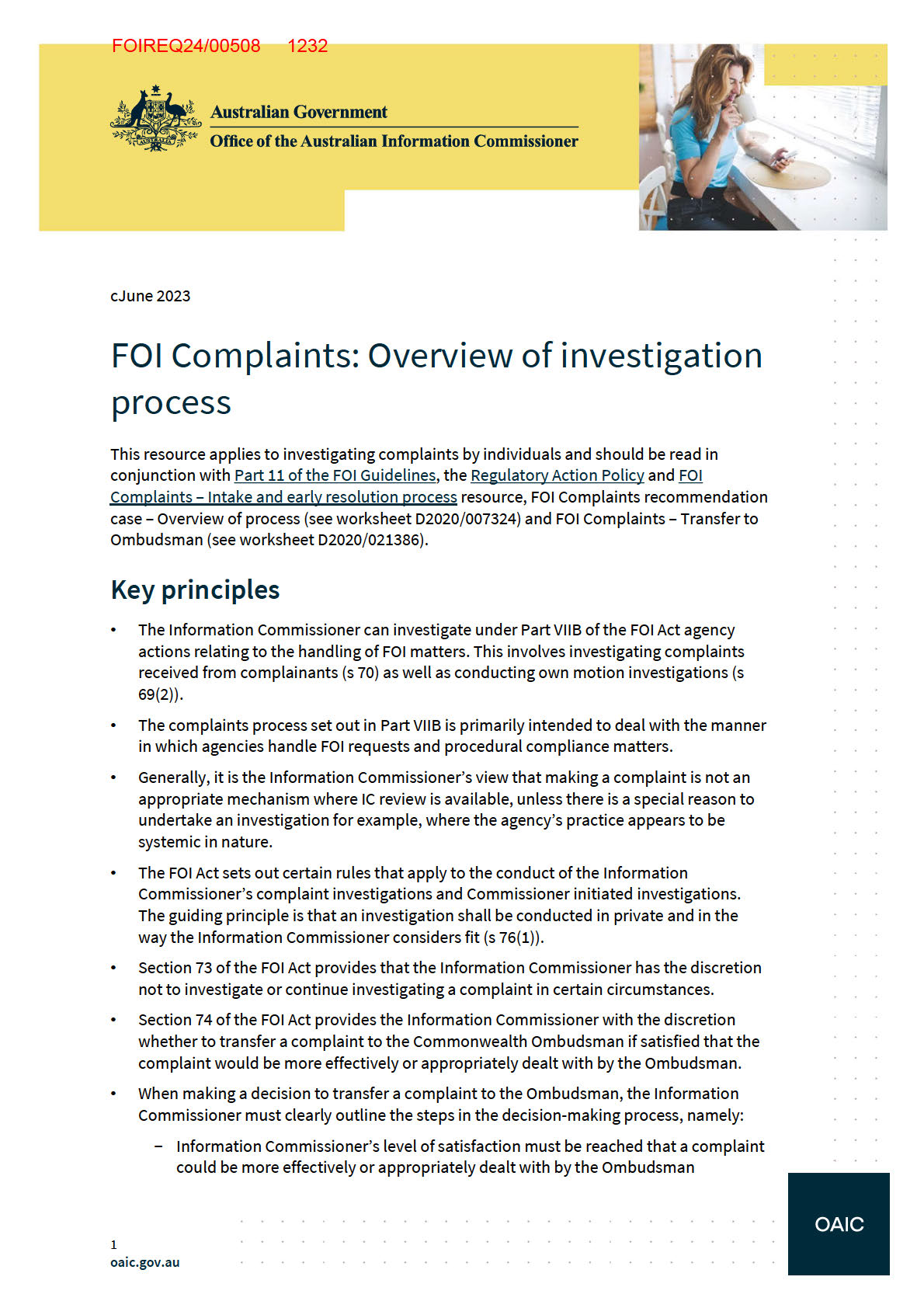

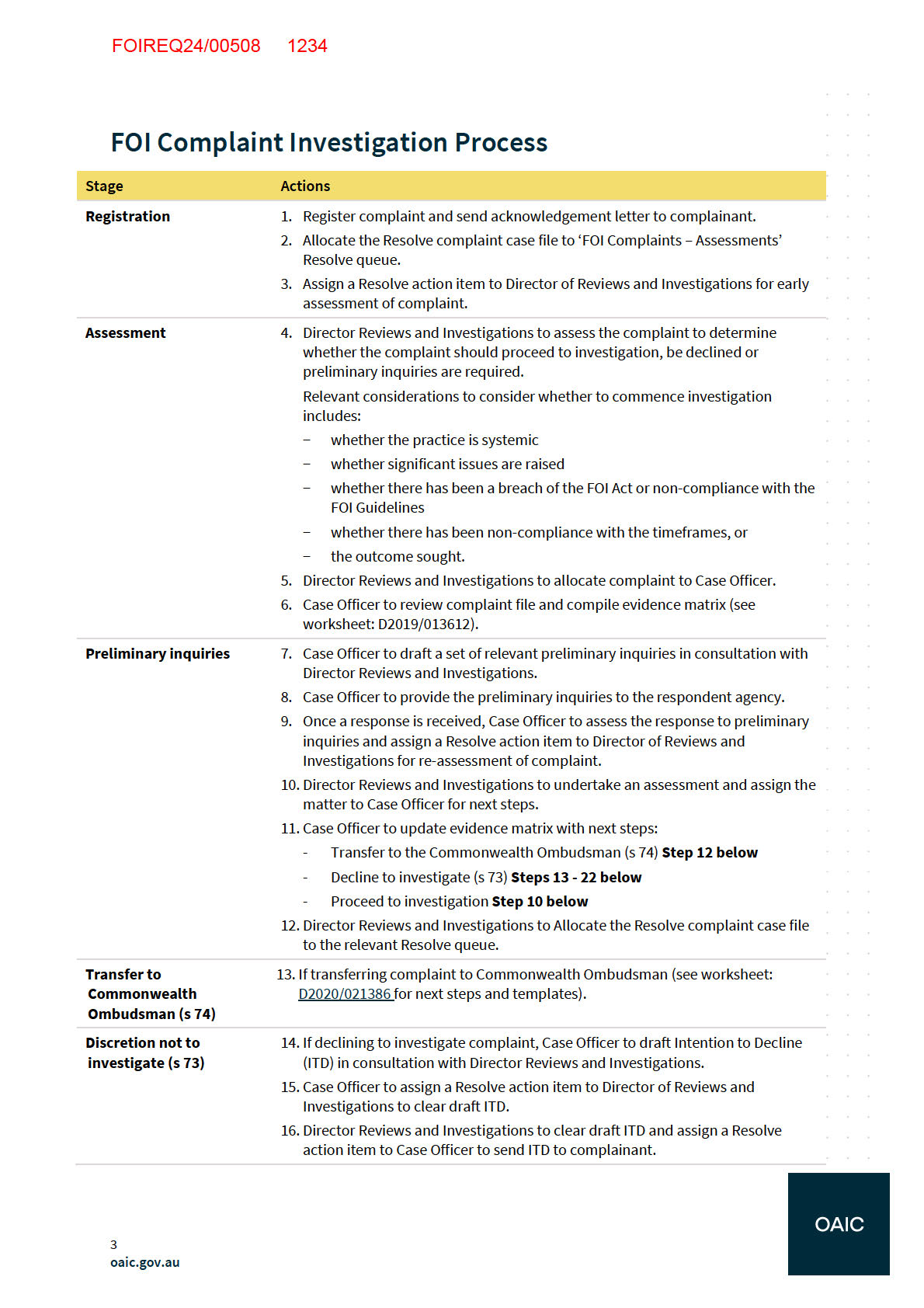
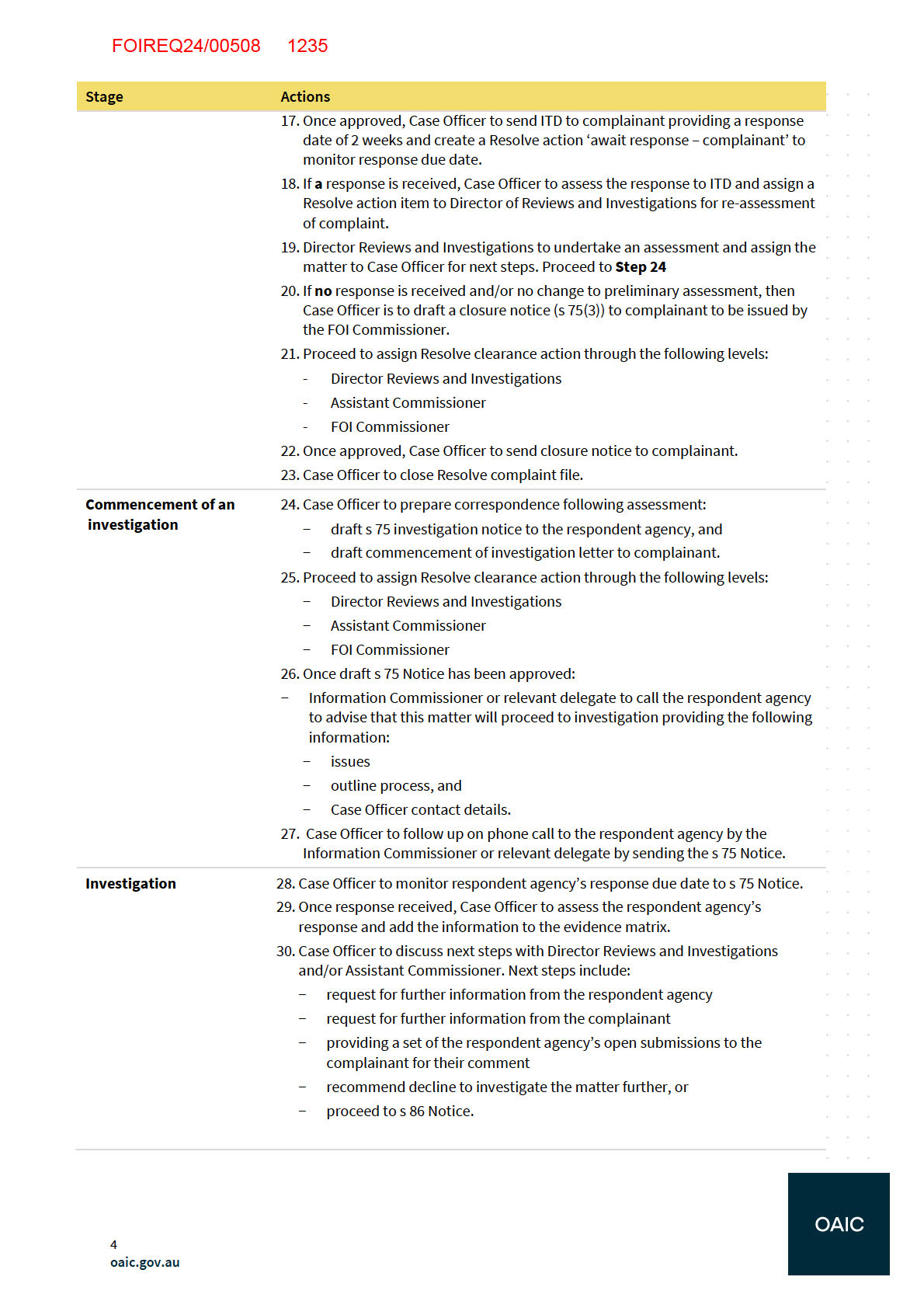
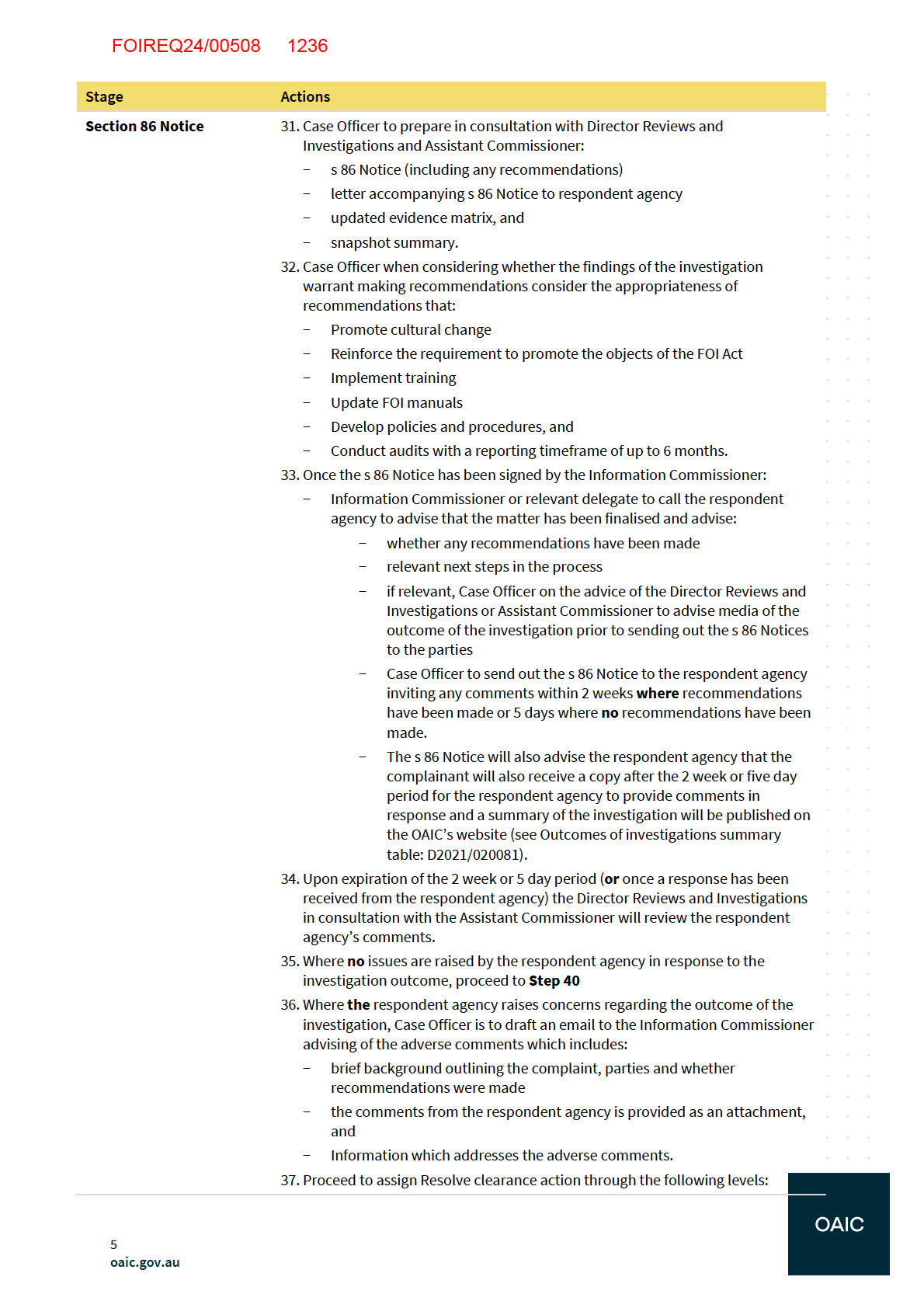
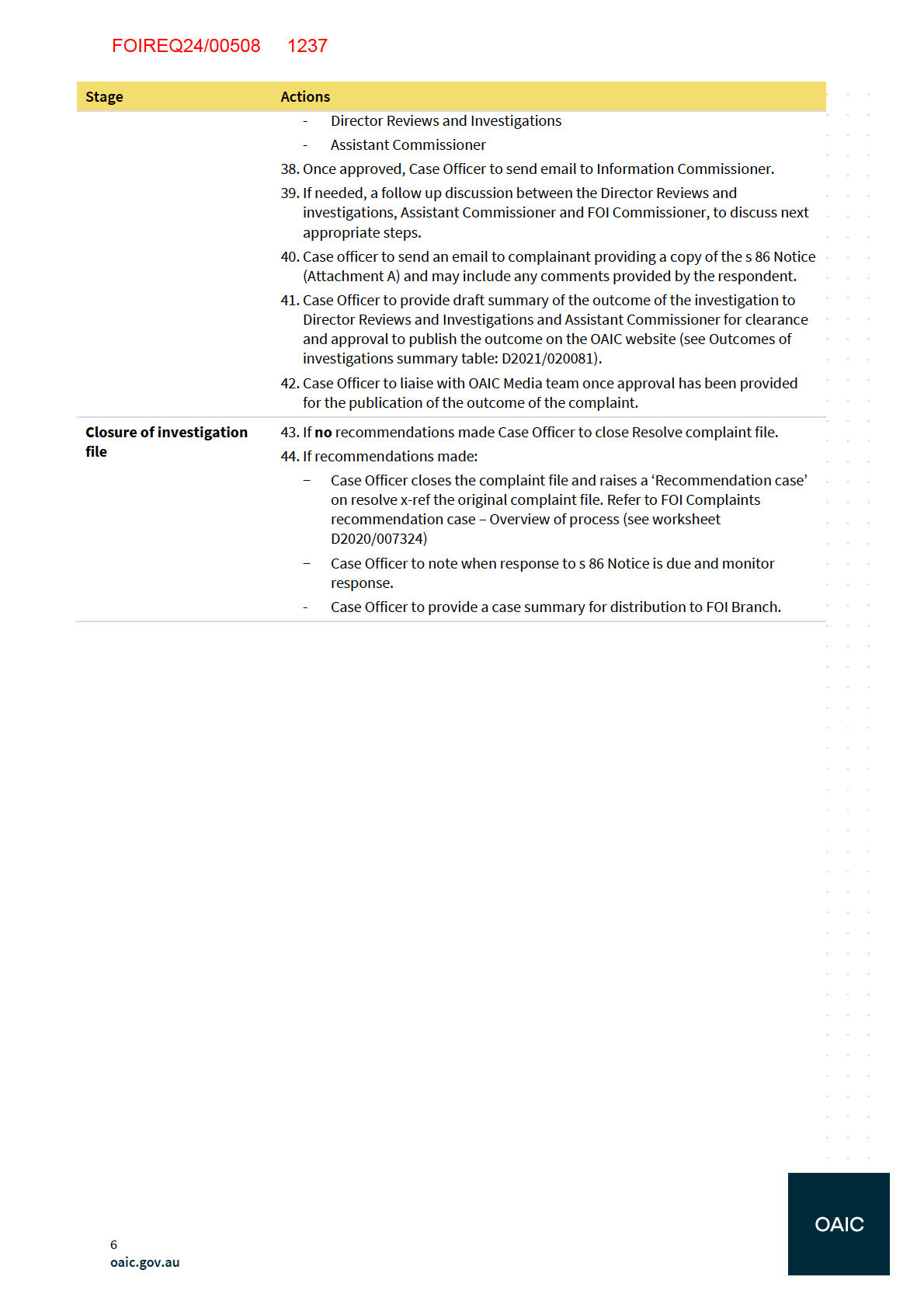
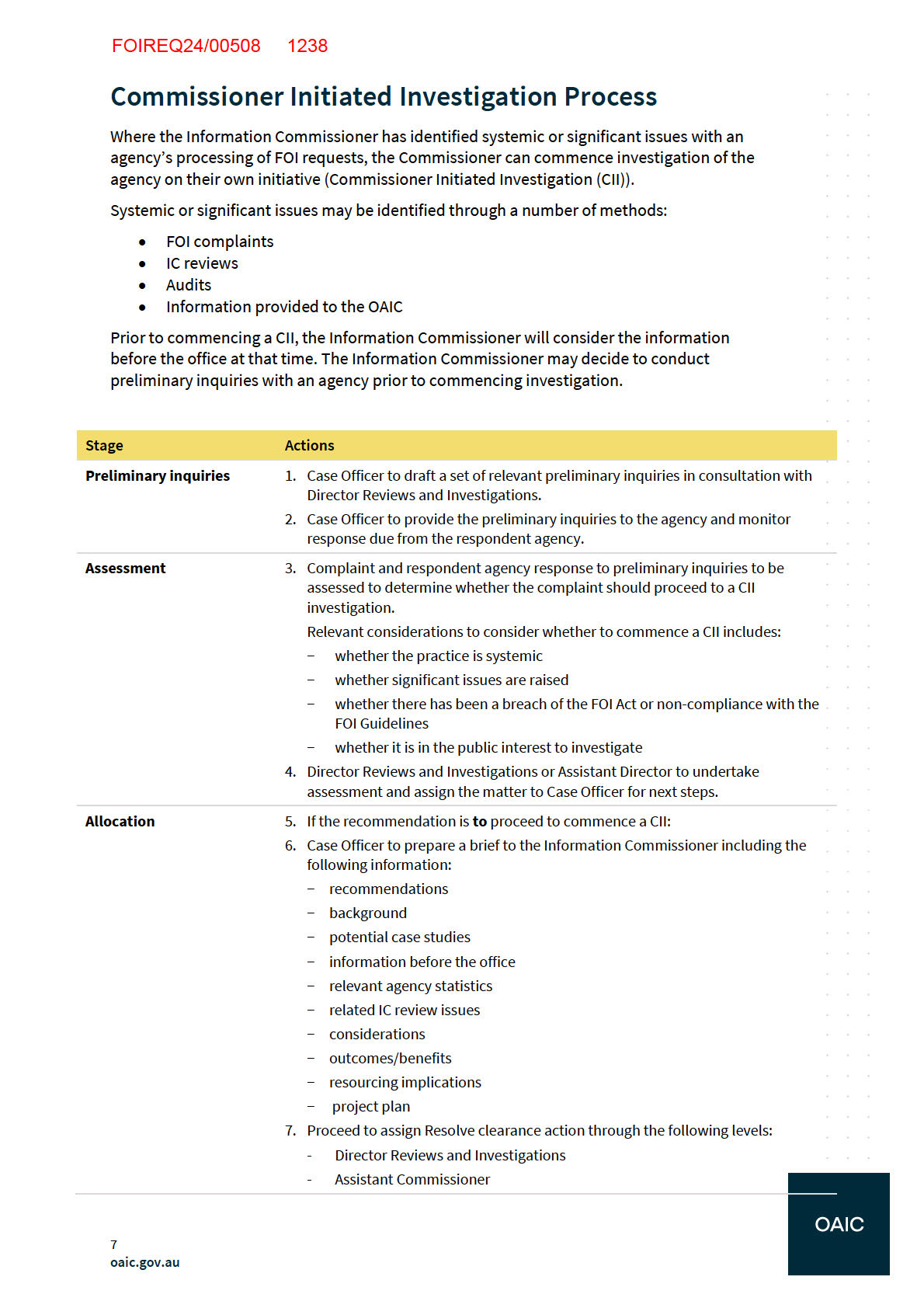
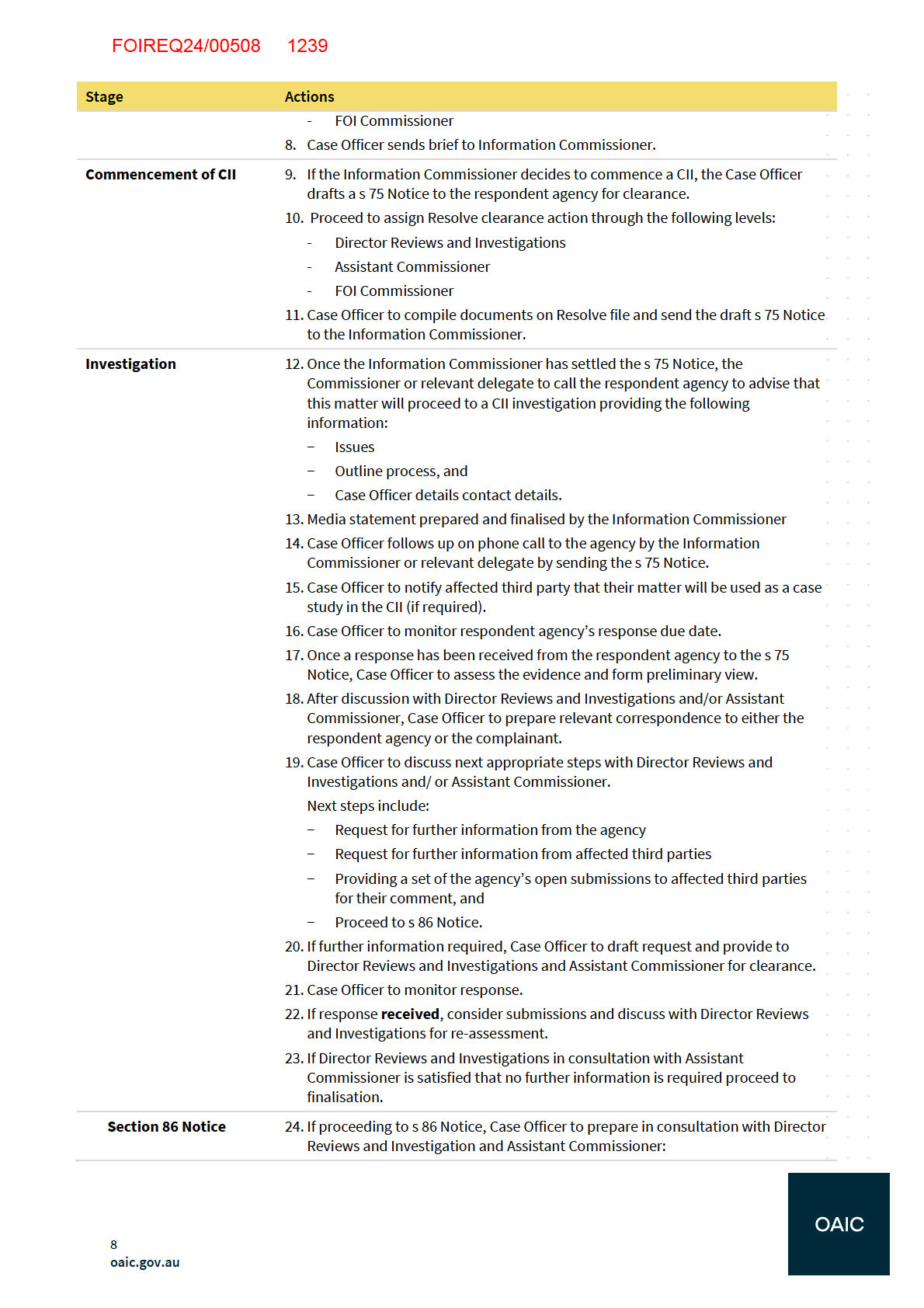
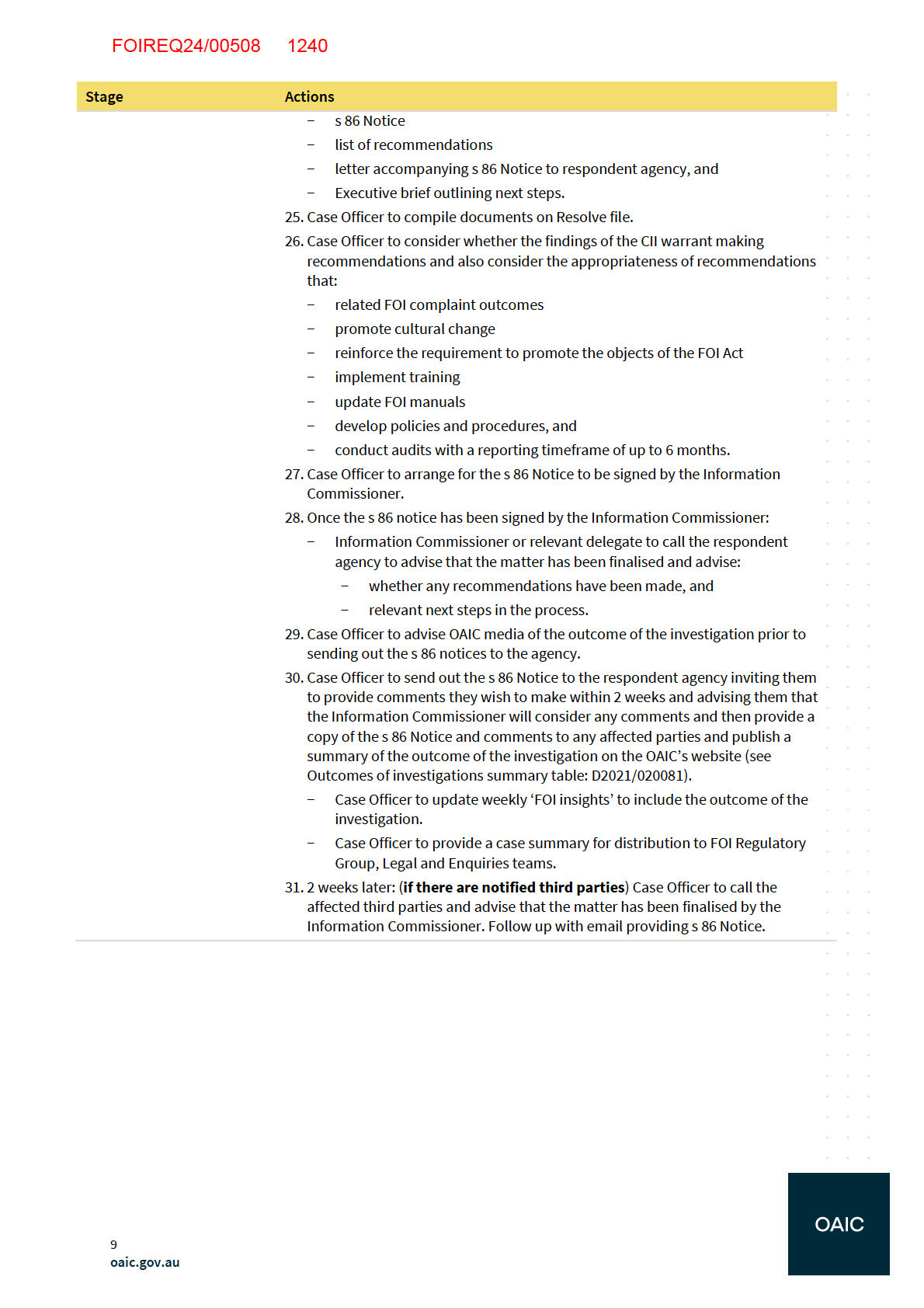
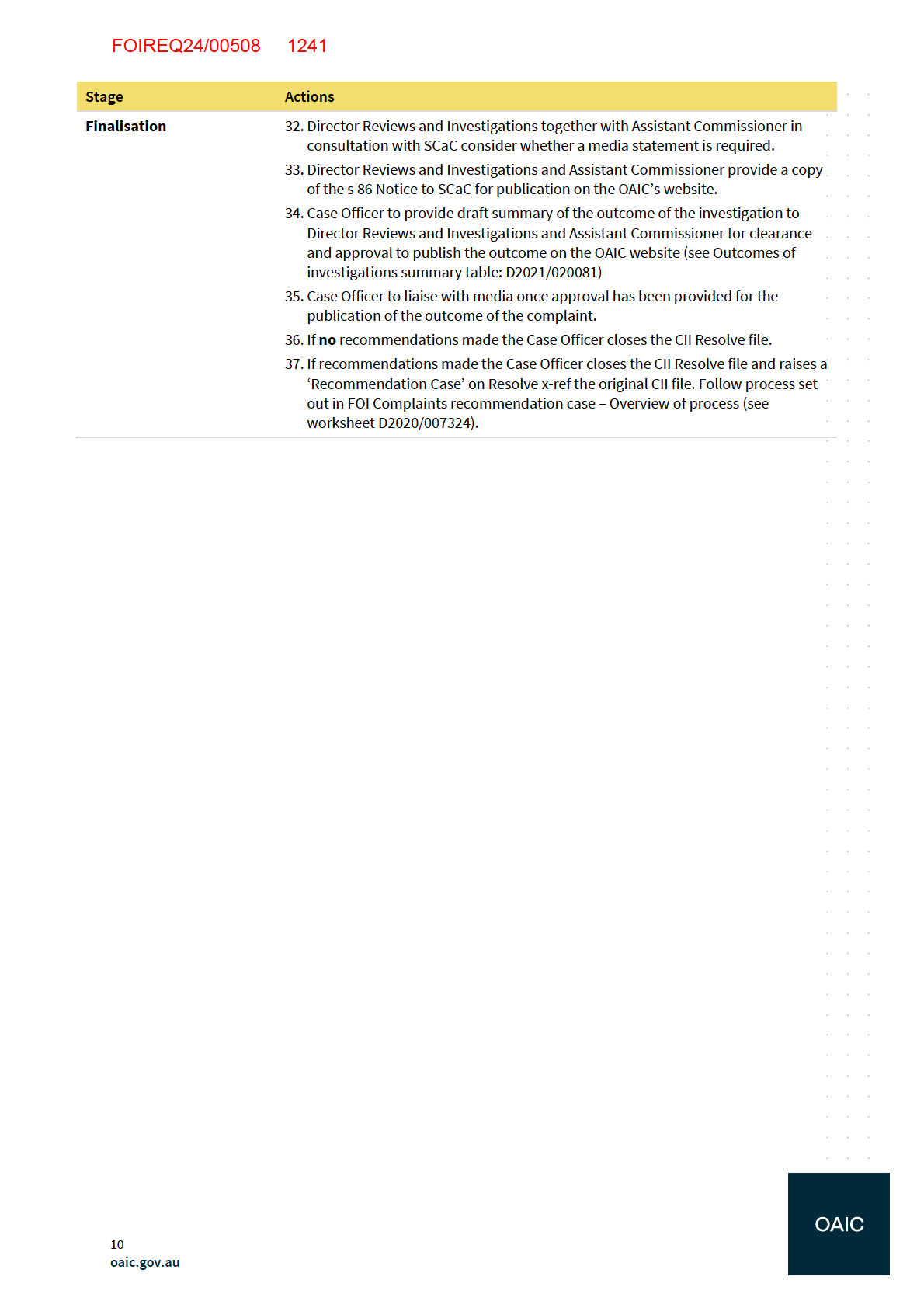
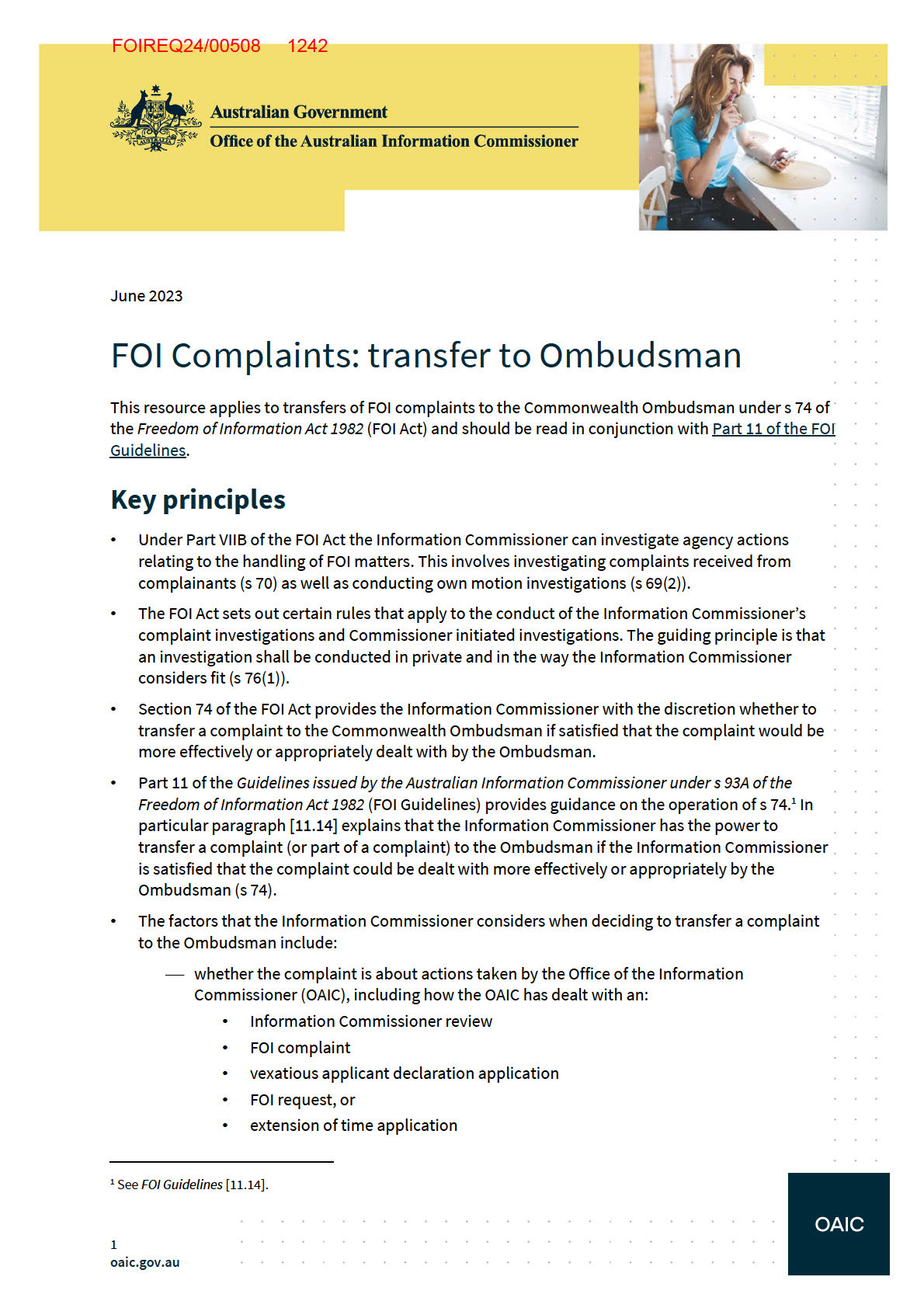
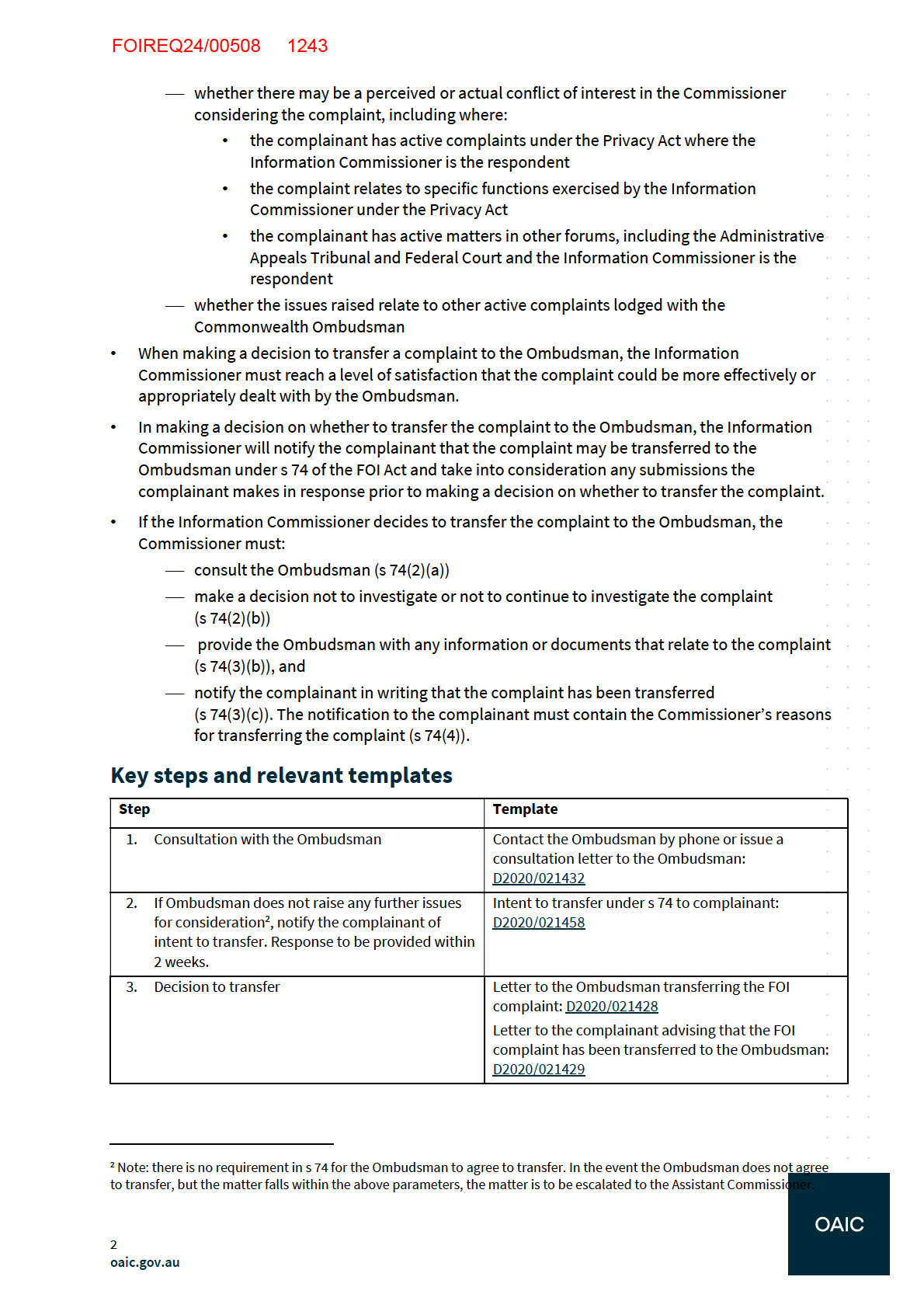
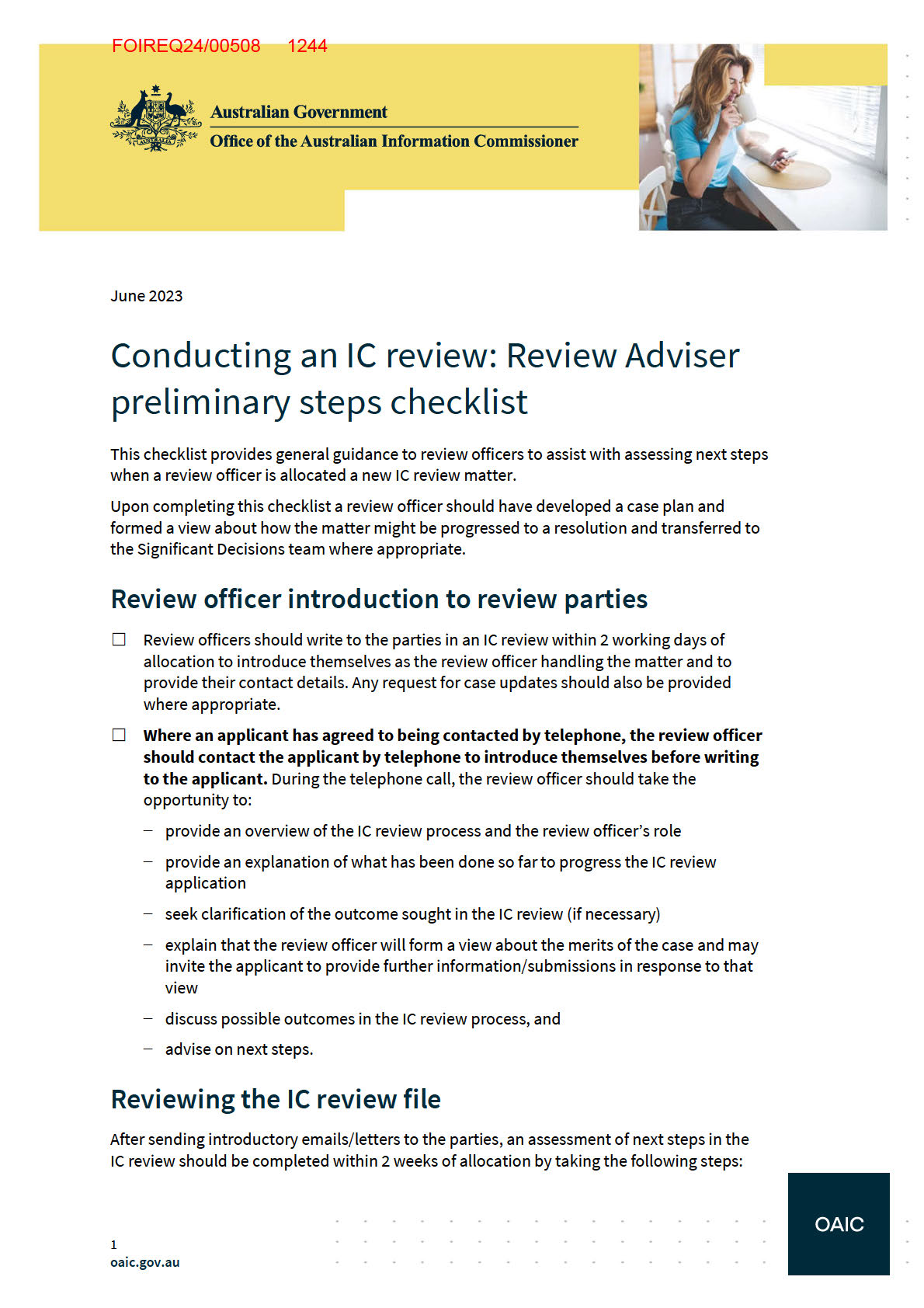
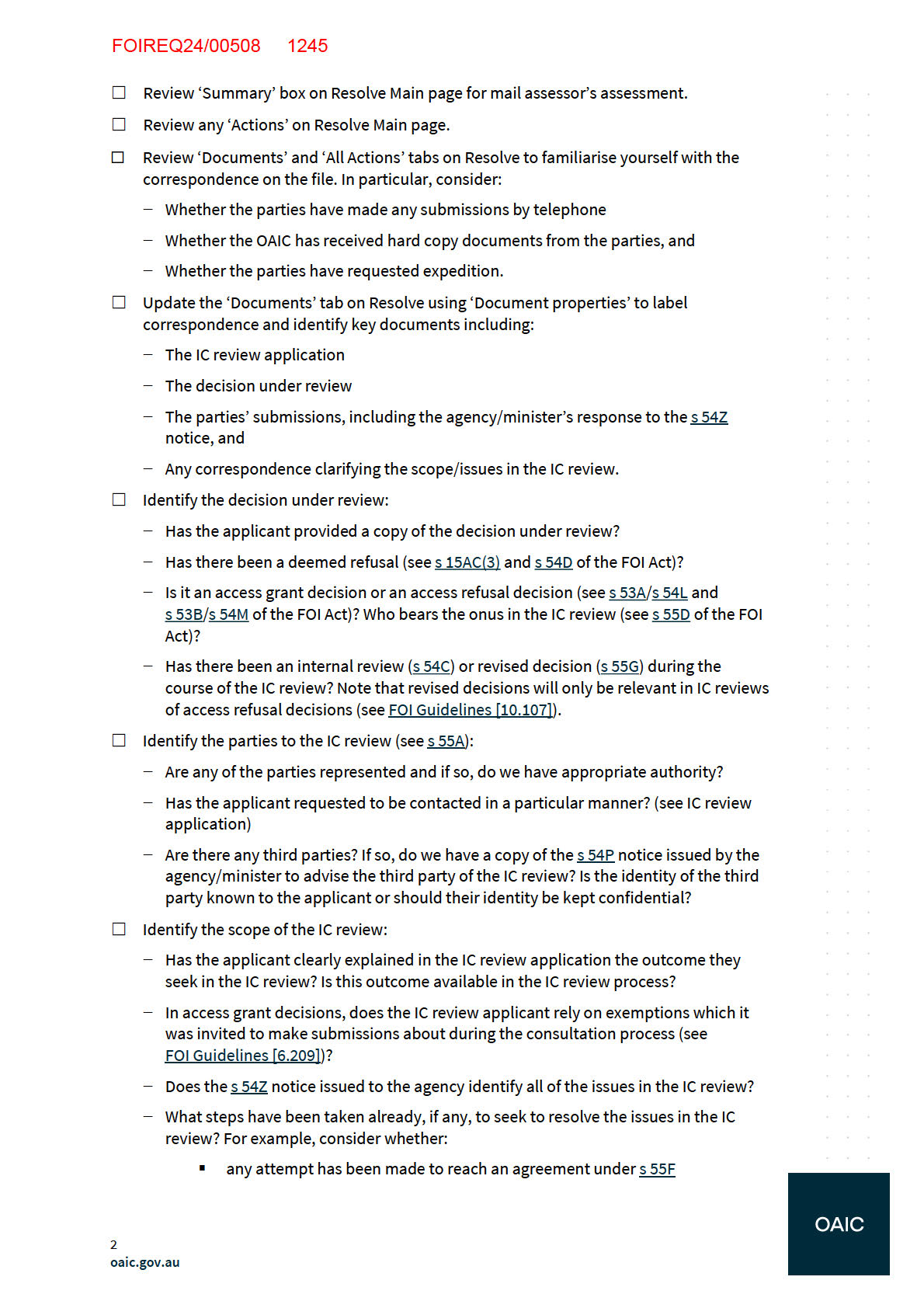
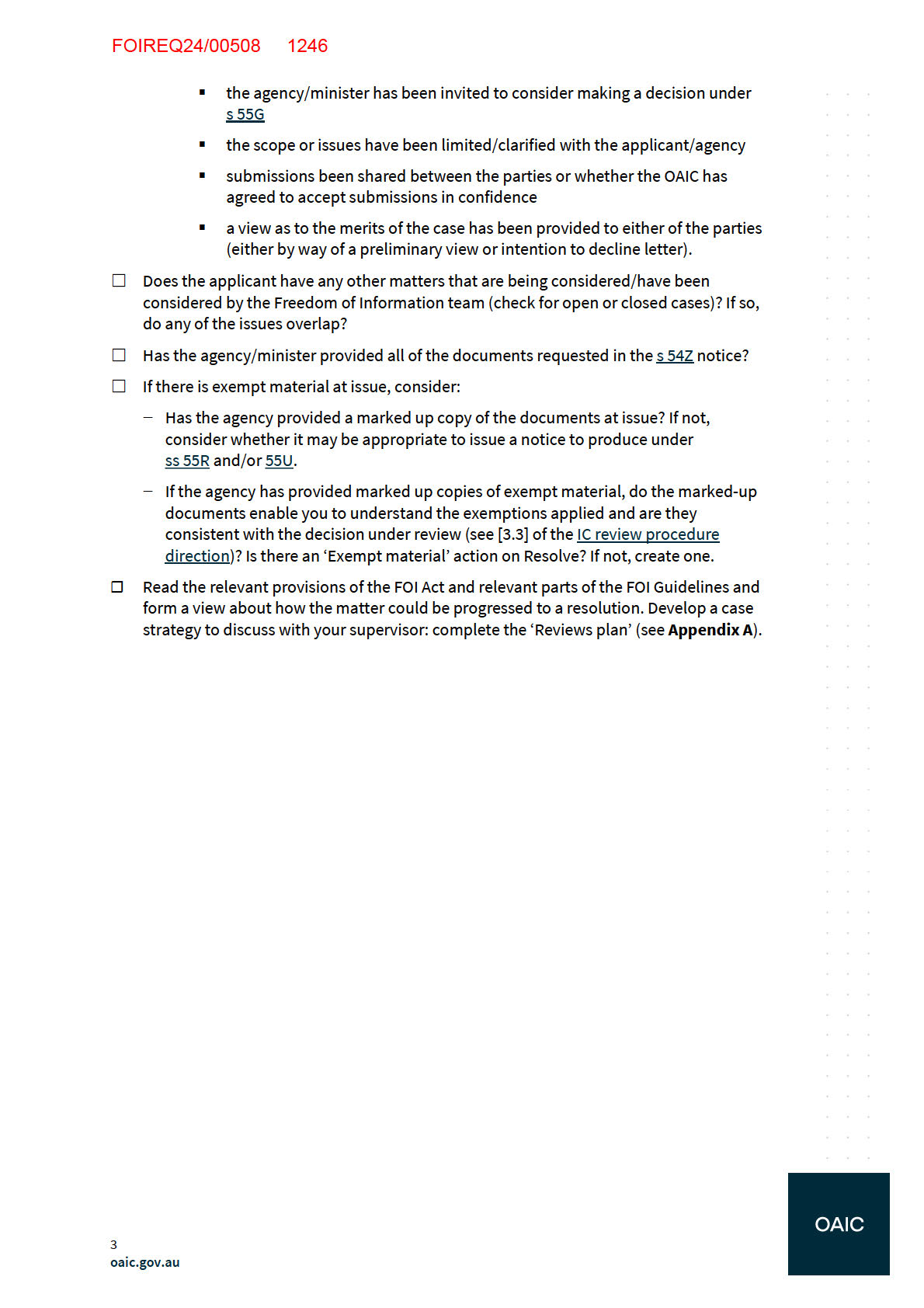
FOIREQ24/00508 1247
Appendix A: D2023/002296
Review Case Plan – Reviews and Investigations
The purpose of the review case plan – Reviews and Investigations is to:
ensure that all relevant procedural fairness steps are taken in a timely manner at the appropriate stage of the IC review process
prevent unnecessary delays by ensuring procedural issues are addressed when they arise
increase efficiency and prevent replication by giving staff the tools to build on the work done and knowledge gained by their colleagues at each stage of
the case management process and
provide confidence to staff and the Executive that matters allocated to the Significant Decisions Team are ready for a decision.
Review advisers in the Reviews and Investigations Team should complete the review case plan prior to transferring the matter to the Significant Decisions Team.
Use of the attachments for planning and review
The review case plan – Reviews and Investigations includes 2 attachments:
Attachment A – Documents at issue – is a list of the documents at issue and the exemptions that apply to each
Attachment B –Further information required – is a matrix setting out what further information is required in relation to each issue.
The purpose of these tools is to identify information gaps and plan the strategy for finalising the review. While the review case plan requires that
Review Advisers ensure the attachments are completed prior to transfer, Review Advisers in the Reviews and Investigations Team should ideally
ensure the attachments are completed upon allocation and updated over the course of the IC review.
4
oaic.gov.au
